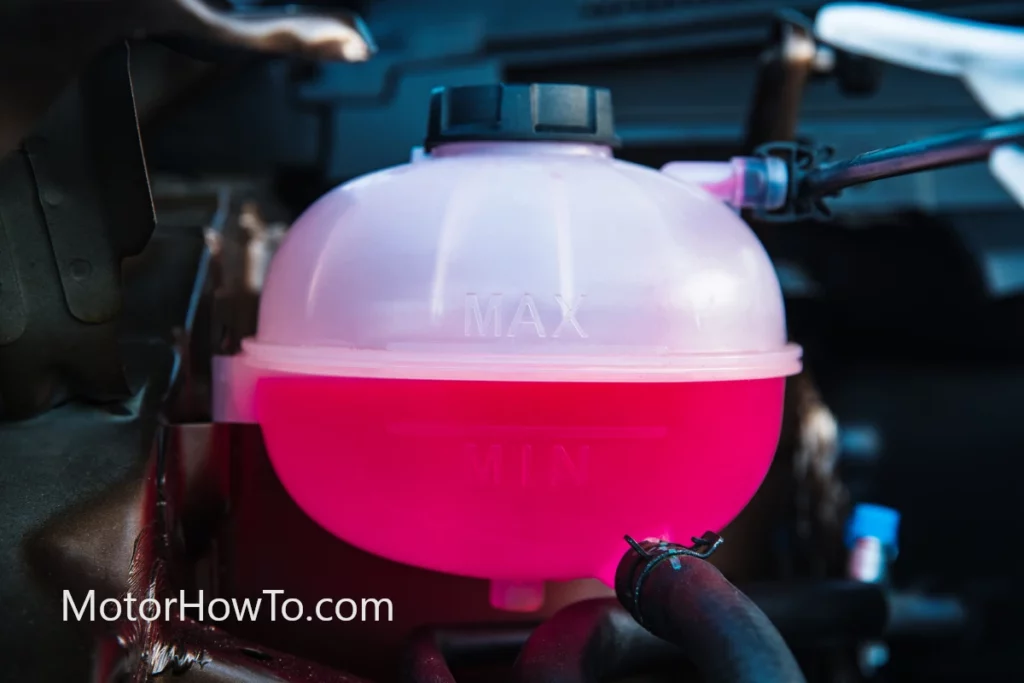Coolant is a crucial component in traditional gasoline-powered cars, helping to regulate the engine’s temperature and prevent overheating.
However, without a combustion engine in electric vehicles (EVs), it may take time to determine whether coolant is necessary.
Electric cars require coolant to cool the battery, power electronics, and electric motor, ensuring optimal performance and longevity.

With the growing popularity of electric vehicles (EVs), many drivers are eager to learn more about how they function and what maintenance is required.
One common question that arises is whether electric cars require coolant.
In this article, we’ll explore the role of coolant in electric cars and delve into how these vehicles are cooled to ensure optimal performance and longevity.
Related:
- Do Tesla Cars Use Oil For Lubrication? (Explained For Beginners)
- Does A Tesla Have Any Oil At All? (6 Fluids Explained)
- Does An Electric Motor In Electric Cars Wear Out? (Explained)
What Kind Of Coolant Do Electric Cars Use?
The type of coolant used in electric cars varies depending on the manufacturer and the specific model.
However, one common factor among all-electric cars is that the coolant used differs from the type used in traditional gasoline-powered vehicles.
Unlike traditional engine coolant, which is primarily used to regulate the temperature of the engine block, electric car coolant is used to cool the battery, power electronics, and electric motor, it must withstand higher operating temperatures without degrading or rusting over time.
One type of coolant commonly used in electric cars is propylene glycol, a non-toxic, biodegradable fluid compatible with most metals and plastics. Propylene glycol has a higher boiling point than water and is more efficient at transferring heat, making it an excellent choice for electric car cooling systems.
Another type of coolant that some manufacturers use is a mixture of water and glycol, similar to the coolant used in traditional cars.
However, this mixture is typically more diluted to reduce the risk of corrosion and may be supplemented with additional additives to improve its cooling properties.
What Fluids Does An Electric Car Need?
While electric cars require less maintenance than traditional gasoline-powered vehicles, some fluids still need to be checked and replaced periodically. Here are the main fluids that an electric car needs:
- Coolant – Electric cars require coolant to cool the battery, power electronics, and electric motor. The type of coolant used varies depending on the manufacturer and the specific model, but it is typically different from the coolant used in traditional cars.
- Brake fluid – Like traditional cars, electric cars use hydraulic brakes that rely on brake fluid. Over time, brake fluid can absorb moisture and become contaminated, leading to brake failure if not regularly replaced.
- Washer fluid – Electric cars have windshields that need to be cleaned like any other vehicle, so they require washer fluid. This fluid is stored in a reservoir and is used to spray the windshield to remove dirt and debris.
- Transmission fluid – Unlike traditional cars, most electric cars do not have a traditional transmission with gears that require lubrication. However, some electric cars have a reduction or two-speed gearbox that may require a specific type of lubricant. It’s important to check the manufacturer’s recommendations to determine if the transmission fluid is required and how often you should replace it.
In addition to the fluids mentioned above, some electric cars may require power steering fluid. This fluid is used to lubricate and cool the power steering pump, which assists the driver in turning the wheels.
However, many electric cars use power steering systems that do not require fluid, so it’s important to check the manufacturer’s recommendations.
Another important fluid to watch for in electric cars is the battery coolant. In addition to the primary coolant used to cool the battery, some electric cars also have a separate coolant system that circulates through the battery pack to keep it at a consistent temperature.
Over time, this coolant can become contaminated or lose its effectiveness, so checking and replacing it as needed is important.
Finally, it’s worth noting that some electric cars do not require oil changes like traditional cars. Electric motors have fewer moving parts than combustion engines and do not require oil for lubrication.
However, it’s still a good idea to check the manufacturer’s recommendations to determine if oil changes are necessary for your vehicle.
Battery Coolant and Its Role in Maintaining Optimal Battery Performance
The battery coolant is a critical component in electric vehicles that significantly maintain optimal battery performance.
The battery pack in an electric car generates a lot of heat during charging and discharging. If this heat is not adequately managed, it can significantly reduce the battery’s lifespan.
The battery coolant circulates through the battery pack, absorbs heat, and transfers it to the outside environment through a radiator or heat exchanger. This process ensures that the battery remains within its optimal operating temperature range, which can significantly increase its lifespan.
The type of battery coolant used in electric cars varies depending on the manufacturer and model. The coolant is typically a mixture of water and glycol or propylene glycol.
Maintaining the proper coolant levels and periodically replacing the coolant to ensure optimal battery performance and longevity is crucial.
What Kind of Electric Motor Lubrication Do EVs Use?
Electric vehicles (EVs) use different types of electric motors, including AC and DC motors, which may require different types of lubrication.
Some EVs use brushless DC motors, which do not require lubrication, while others may use AC motors that require specific lubrication.
AC motors in EVs typically use a synthetic lubricant, such as polyalphaolefin (PAO) or polyethylene glycol (PAG), to provide the necessary lubrication for the bearings other moving parts.
These lubricants have a higher resistance to degradation and oxidation, making them more suitable for high-temperature environments where EV motors operate.
In addition to providing lubrication, the motor oil in EVs also helps to cool the motor and remove heat generated during operation. This is particularly important for high-performance EVs that generate significant heat during operation.
The oil is circulated through the motor using a pump, which helps to distribute the oil evenly and ensure that all parts are properly lubricated and cooled.
How Does Brake Fluid Maintenance affect Regenerative Braking?
Brake fluid is a crucial component in a car’s braking system, including electric vehicles (EVs) that use regenerative braking.
Regenerative braking is a technology used in EVs that recovers the energy lost during braking and stores it back in the battery for later use. This technology relies on the car’s braking system, which includes the brake fluid.
Brake fluid maintenance is essential to ensure the proper functioning of the braking system and the effectiveness of regenerative braking.
Brake fluid can absorb moisture over time, which can cause it to boil at a lower temperature and reduce the braking system’s effectiveness. If the brake fluid is not replaced periodically, it can lead to brake failure and compromise the regenerative braking system.
The brake fluid used in an EV must be compatible with the car’s braking system and have a high boiling point to withstand the heat generated during regenerative braking.
Also, the quality and type of brake fluid used in an EV can affect the regenerative braking system’s performance. Using the wrong brake fluid or a low-quality product can reduce braking efficiency and compromise regenerative braking.
Conclusion
Electric cars require coolant to cool the battery, power electronics, and electric motor to ensure optimal performance and longevity.
There are different types of coolants used in electric cars, and the most commonly used is propylene glycol, which has a higher boiling point than water and is more efficient at transferring heat.
Other fluids required for electric cars include brake fluid, washer fluid, and battery coolant, which are crucial in maintaining optimal battery performance.
Some electric cars require power steering fluid, but most use electric power steering systems that do not require fluid.
While most electric cars do not require oil changes, it is still important to check the manufacturer’s recommendations to determine if they are necessary for a specific vehicle.
Maintaining the proper levels and periodically replacing the fluids mentioned above is crucial for ensuring electric cars’ optimal performance and longevity.
Moreover, electric car owners should watch the battery coolant, which significantly maintains optimal battery performance by managing the battery’s heat.
Sources
What You Need to Know About Electric Car Maintenance
Do EVs Use Coolant, and Do You Need to Change It?
Cooling Improves Lithium-ion Battery Performance



